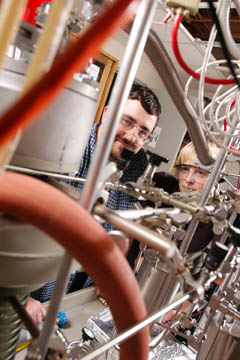 General Facts and Hallmarks
General Facts and Hallmarks
- Ten bachelor's degrees (many with options and concentrations of your choice), seven minors, one certificate, and a number of pre-health and specialized programs.
- Average junior/senior level class size: 15
- The School of Science Complex includes the Benson, Fasenmyer, Hammermill, Nick, Prischak, Witkowski, and Zurn buildings; Roche Hall; Otto Behrend Science (OBS) building; Yahn Planetarium; Mehalso Observatory; a second observatory; and two annexes.
- State-of-the-art labs—including high-tech nursing simulation labs—provide superior hands-on learning experiences.
- The surrounding natural environment also serves as an outdoor laboratory—with the campus designated as an arboretum, and bordered by Wintergreen Gorge and its Fourmile Creek Trail. (Plus, our location near Lake Erie, Presque Isle State Park, and the Lake Erie Grape Belt makes Behrend ideal for outdoor fieldwork.)
- Scientific research opportunities allow students to collaborate with faculty on research projects that make a difference.
- Right now, an astrophysicist is conducting experiments for NASA that involve theoretical modeling of planetary climates, and chemists are synthesizing new molecules of interest to industry and pharmacy.
- The Lake Erie Regional Grape Research and Extension Center, located in nearby North East, PA, and part of a cooperative effort between Penn State and Cornell University, offers summer programs in viticulture and vineyard management. LERGREC researchers study entomology, horticulture, and plant pathology.
- Pennsylvania Sea Grant, administered by Penn State Behrend, offers special research opportunities for School of Science students on Lake Erie and elsewhere.
- Among only 619 colleges nationwide, and one of two in northwestern Pennsylvania that meet the American Chemical Society guidelines for approved programs.
- Penn State Behrend annually graduates more ACS-certified chemists than most comparably sized schools.
- The Secondary Education in Mathematics degree is accredited by the National Council for Accreditation of Teacher Education through the University’s College of Education.
- The baccalaureate degree program in nursing, master's degree program in nursing, Doctor of Nursing Practice program, and post-graduate APRN certificate program at The Pennsylvania State University are accredited by the Commission on Collegiate Nursing Education, 655 K Street, NW, Suite 750, Washington, D.C. 20001;
202-887-6791. - The Health Professions option in the Biology major allows students to apply the first-year courses in approved professional programs to the Penn State degree, shortening the time required for medical, dental, pharmacy, or optometry studies.
- Science graduates are working for organizations such as the U.S. Environmental Protection Agency, Erie Insurance Group, Lord Corporation, General Electric, and Kodak. They also have studied for advanced degrees at institutions such as the University of North Carolina at Chapel Hill, the University of Arizona, the University of California at Santa Barbara, Purdue University School of Veterinary Medicine, the State University of New York at Buffalo, and the Penn State College of Medicine, to name a few.